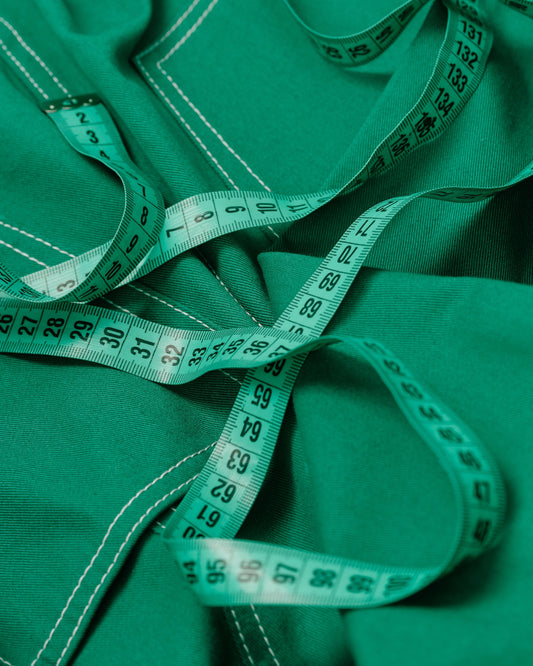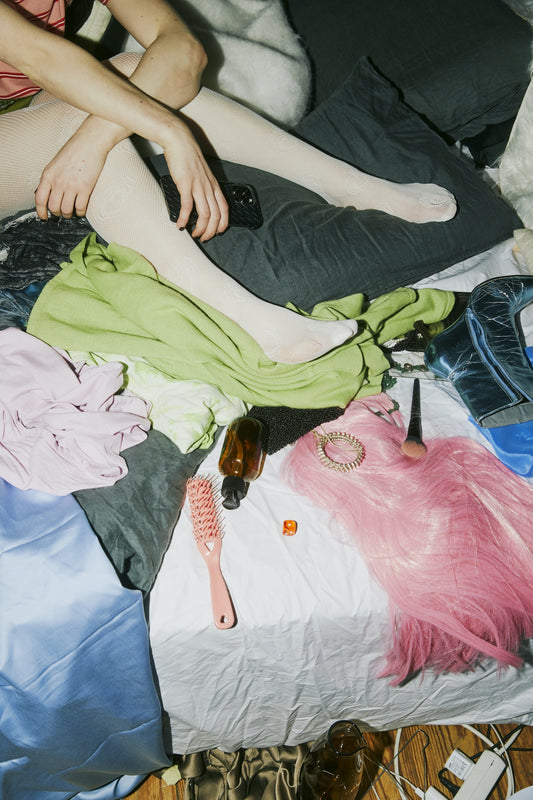Specific figures are always up for debate but, in 2020, the Intergovernmental Panel on Climate Change (IPCC) reported that the fashion industry was producing 10% of the world’s annual carbon dioxide emissions and was estimated to be using around 1.5 trillion litres of water every year.
These are huge numbers that can only make sense when you learn that in 2010 the industry was producing an estimated 150 billion garments every year – 13 years later and that number has only risen.
The reported numbers leave us with no doubt that the fashion industry produces far too many clothes. However, the most shocking part of the story is that around a third of those garments end up not being sold, but destroyed.
Tackling this issue is a huge part of Banana’s modus operandi.
The problem with excess inventory
The traditional fashion industry business model relies on fashion buyers predicting the number of products they will sell ahead of time. Brands and businesses don’t want to sell out stock – they plan to sell the excess in end-of-season sales.
“To sell out of a product actually costs a business more than having extra product that you end up discounting,” said, Mairi Fairley, partner of retail practice at OC&C Strategy Consultants, in conversation with Vogue UK. “From a business perspective, buying more is better because you don’t want to risk not having enough.”
The problem with what to do with all the excess inventory arises when fashion companies choose not to put their products on sale for fear of devaluing the exclusivity of the brand.
Instead, they choose to destroy it or dump it in landfills.

How can the industry change?
For the industry to change, eliminating the guesswork needed when ordering within the traditional business model is a great first step, which is where the preorder business model comes into play.
A preorder model is simply when a customer chooses a product, pays for it and commits to receiving it weeks or even months later. Essentially, preorder means that products are only made once they have been ordered and paid for.
Buying this way means that brands aren’t left with excess stock or wasted materials plus it can also make the final garment more unique, and sometimes even more valuable.
“Apart from being better for the planet, the preorder model is ideal for Banana as it allows creators to handle design and marketing, while producers handle production and shipping after the preorders have been received,” says Luke Grana, Banana co-founder.
“This means creators don’t have to deal with production, inventory investment and management, and logistics. They can focus 100% on creativity and monetising their products.”
Brands championing preorder
As well as Banana, the preorder model is being used by several fashion designers and larger brands as a way to not only reduce waste but also lessen environmental impact.
For example, preordering has been central to Moda Operandi’s business model since the moment the site launched.
“With preorder, a look is only produced when there is proven demand,” April Hennig, Chief Merchandising Officer at Moda Operandi told Vogue UK. “If everyone were to shop in this way, there would be much less waste in the fashion cycle.”
Moda Operandi calls this area of the business its 'Trunkshow' offering, which is currently responsible for 20 per cent of overall sales.
Vogue UK reported that the data Moda Operandi collected during a preorder period helps inform the product it chooses to buy for its ready-to-ship products, again helping to reduce waste.
“The selling metrics are a strong predictor of what a wider audience will demand later in the life cycle,” Henning explained to Vogue, adding that the brands themselves also use this data.
“Our designers often use our selling reports to make decisions for their own retail stores or e-commerce shops – we are the only retailer who can provide this information prior to their factory orders being cut.”
As well as the positive effect preordering has on the environment, in a post-Covid world it’s also a smarter way for brands to release collections.
Thomai Serdari, a luxury marketing professor at NewYork University told Vogue Business: “There is so much risk in the market today, and consumer behaviour is unpredictable,” he said. “[Pre-orders] allow for better planning, production investments can be more accurate, and brands can also better measure consumer tastes and preferences.”
Benefits of a preorder model
It seems that if the entire industry switched to a preorder business model the problem it has with waste would almost be eliminated.
Manufacturing only what’s been sold would cut down on textile waste as well as buttons, zips and fasteners, saving the brand money and reducing the negative effect on the environment.
Plus, there are some other unexpected benefits:
Opens the industry up for new designers
Designing, and selling, smaller collections on a preorder basis lowers the financial barrier for new designers looking to launch a brand. Usually, a large investment is needed to get a brand up and running but when you’re only making what’s already been sold a large pot of money is no longer needed. All this can help more new faces break into the fashion industry.
Helps brands with inventory forecasting
Knowing the exact number of products or amount of materials to purchase not only helps brands keep waste down, but it also helps their bottom line.
Telfar and Khaite are two New York brands having huge success with a preorder model, as is Misha Nonoo who quit Fashion Week in 2016 and terminated all her wholesale relationships.
“I found it to be an endless loop of chasing my tail,” Nonoo told Vogue Business. “A buyer would come to the showroom and they were so reliant on looking at a spreadsheet, as opposed to knowing their customer.”
Nonoo switched her business model and her eponymous brand now produces all pieces on demand.
Access to designer’s most creative ideas
A lot of what we see in store from a designer is what’s been decided, usually by a buyer, will sell. This can mean consumers miss out on a designer’s most creative ideas – Moda Operandi was started so customers could access full runway collections rather than just a buyer’s selection.
When a designer doesn’t have to worry about whether something will sell or not after they’ve made it, they are more likely to showcase their best work. And you, the lucky customer, are the person to benefit from that creative freedom.
So, next time you’re looking for a new brand or designer to add to your seasonal wardrobe see if they’re working with a preorder model. It benefits everyone — you, the designer and, most importantly, the planet.


